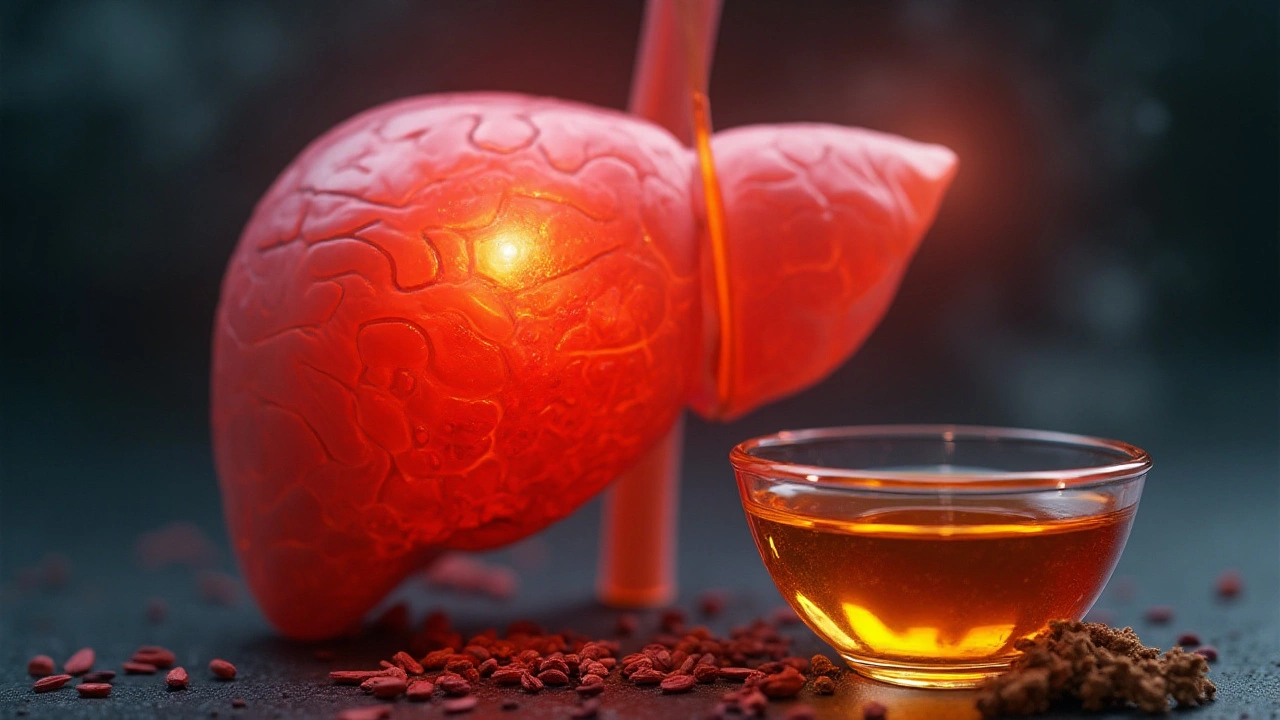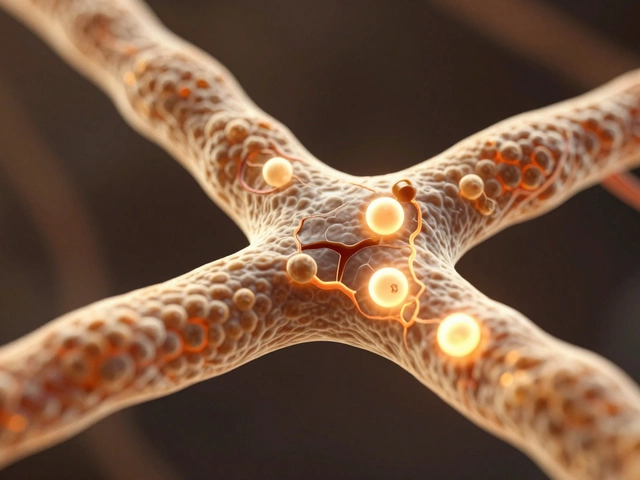Amidst the myriad of health trends popping up each year, apple cider vinegar (ACV) remains a steadfast favorite. Touted for its potential benefits, many enthusiasts claim it aids in everything from weight management to skin health. Recently, some health gurus have also suggested it can help detoxify the liver, a claim that begs for a deeper dive.
Before reaching for the vinegar bottle, it's crucial to understand how our body's detox powerhouse, the liver, works. Against a backdrop of both scientific studies and anecdotal accounts, join me in unraveling the truth behind apple cider vinegar’s role—or lack thereof—in cleansing this vital organ.
- Understanding Liver Detoxification
- Apple Cider Vinegar: An Overview
- Scientific Evidence on Liver Health
- Practical Considerations and Tips
Understanding Liver Detoxification
Our liver is a hardworking organ that quietly noses into nearly everything happening in the body. It acts like a meticulous housekeeper, breaking down complex compounds, balancing nutrients, and diligently cleaning up toxins. But what does it truly mean for the liver to detoxify? Since childhood, we've often heard about detoxing rampant toxins, but the liver doesn't need any fancy drinks or gimmicks to detox. It does what it’s built to do—filter the blood and remove unwanted substances from the body efficiently. Liver health is crucial for breaking down alcohol, medications, and even the pollutants we inadvertently consume. It filters the blood, balancing, processing, and converting nutrients that are later stored or used as energy.
The liver's responsibilities don't end there; it's also responsible for producing important proteins necessary for blood clotting and channeling bile into different digestive processes. A healthy liver does all this and more, thirty-some days a month, without skipping a beat or requesting a miracle herb. This natural detoxification process is driven by cellular mechanisms that transform toxins into far less harmful substances or even into molecules so mundane that they are easily excreted through urine or feces. Detox diets are more a trendy term rather than a medical necessity since your liver is already performing the critical detox work under normal physiological conditions.
Dr. Jonathan Wright, a leading figure in medical research, mentions, "Good hydration, a balanced diet, regular exercise, and sleep are sufficient to maintain normal liver health for most people without recourse to detoxes, fads, or restrictive diets."
"Contrary to popular belief, the idea of flushing your liver using certain concoctions isn't supported by comprehensive clinical evidence. The primary requirement for a healthier liver always settles back to a healthy lifestyle."This statement, although blunt, embarks us on a clearer understanding that while the aspiration to help our liver is noble, we should be aware of what really benefits it in the long term.

Apple Cider Vinegar: An Overview
Apple cider vinegar, or ACV as it is frequently called, is a type of vinegar made from fermented apple juice. Its history dates back thousands of years, with references to its use by ancient cultures for flavoring and preservation. Today, it remains a staple in many households, praised by health enthusiasts for a spectrum of purported benefits. But what exactly makes this tangy liquid so special? The process starts when apples are crushed and their juice is extracted. Yeast is then added, turning the sugars into alcohol—a process known as fermentation. Bacteria are subsequently introduced to convert this alcohol into acetic acid, the fundamental component that gives vinegar its sharp taste and alleged health perks.
Beyond its culinary applications, ACV has been purported to offer medicinal benefits for centuries. It contains vitamins such as B1, B2, B6, and C, along with minerals like potassium and magnesium, though in minute quantities. Some studies have suggested that these nutrients, combined with the acetic acid, may contribute to a myriad of health benefits. A standout study published in the 'Journal of Functional Foods' highlighted that a daily intake of ACV reduced blood sugar levels, hinting at its potential for managing type 2 diabetes.
Apple cider vinegar has also earned a reputation as a popular home remedy. Its antimicrobial properties make it a favored choice for treating sore throats or skin irritations. Despite the buzz, health experts are divided on its efficacy. Some argue that these anecdotal successes could be attributed to a placebo effect or lifestyle changes occurring concurrently with vinegar intake. Quoting a nutritionist from the Harvard School of Public Health:
"While apple cider vinegar contains certain nutrients, it's the lifestyle transformations—eating healthier, exercising more—that usually coincide with its use, which lead to noticeable changes."This encapsulates the mystery surrounding ACV: separating lore from legitimate benefit.
The popularity of ACV extends into the health supplement market, with numerous products available touting the benefits of this powerful elixir. Whether it's in liquid form, gummies, or capsules, apple cider vinegar has found its way into our wellness routines. However, it's crucial to approach these supplements with caution, as not all products are created equal. The efficacy and safety of such supplements can greatly vary, making it essential to consult a healthcare provider before integrating them into your diet.
Interestingly, while there's been much debate about its health benefits, scientific backing remains limited. While some early studies show promising results, comprehensive, large-scale research is necessary to confirm the full extent of ACV’s potential. This leaves a lingering question for health aficionados: is it truly a miraculous detoxifier, or simply another dietary fad?

Scientific Evidence on Liver Health
When it comes to the effectiveness of apple cider vinegar in promoting liver health, scientific studies provide a mixed bag of evidence. The liver is one of the most resilient organs in the body, capable of regenerating and detoxifying without external aid. However, this has not stopped people from exploring natural supplements that might offer additional support. Apple cider vinegar, known for its acetic acid content, is often cited as a potential liver aid. Yet, how much of this is backed by science?
A handful of studies suggest that acetic acid, the main component in apple cider vinegar, may have a positive effect on liver health. One study conducted on rats showed that acetic acid could mitigate some signs of liver damage caused by a high-fat diet. This has led to a belief that apple cider vinegar might mimic these results in humans. However, the leap from animal studies to human applications is vast. Human liver function and response to toxins are far more complex, and significant trials are still needed. A fascinating aspect of liver studies is how they reveal the organ's innate ability to repair itself—it’s not uncommon for the liver to recover from severe conditions with minimal intervention beyond adequate nutrition and hydration.
The claims about apple cider vinegar's detoxifying powers largely stem from the purported ability of vinegar to enhance the body's metabolism. By improving metabolic rates, some propose that apple cider vinegar aids the liver in processing toxins effectively, thereby cleansing itself. It's worth noting, however, that qualified nutritionists generally affirm that a healthy liver self-cleans during daily bodily processes without the need for harsh cleanses. A renowned liver specialist stated, "The notion of detoxifying the liver with such supplements often overlooks the liver's natural capability to expel toxins through bile production."
Intriguingly, there is also historical anecdotal evidence where apple cider vinegar was used in traditional medicine for various ailments, though documentation of its specific effects on the liver is sparse. It remains crucial to prioritize safe approaches to liver health, particularly in the absence of substantial science behind these natural remedies. Health enthusiasts advocating for vinegar's use emphasize accompanying it with a balanced diet and regular physical activity. These lifestyle choices have a solid track record of supporting liver vitality.
A Global Liver Institute nutritionist once expressed, "Relying solely on supplements without addressing the fundamental principles of a healthy diet and lifestyle is a bit like trying to build a house without foundations." This insight underscores the importance of balanced approaches over singular, unverified solutions.
Ultimately, while there exists a corpus of work exploring acetic acid's potential, the direct benefits of apple cider vinegar on liver health remain an open field for scientific exploration. The need of the hour is well-conducted, peer-reviewed human studies that can elucidate the real impact, if any, of apple cider vinegar on the liver. Until then, incorporating it into a daily regimen should be approached with cautious optimism rather than expectation.

Practical Considerations and Tips
When it comes to incorporating apple cider vinegar into your daily routine for better liver health, there are a few things to keep in mind. ACV is highly acidic, which means it should always be diluted before consumption to avoid damage to your teeth enamel and throat. A common practice is mixing one or two tablespoons with a large glass of water. This not only makes it safer to ingest but also encourages you to drink more water throughout the day, aiding in overall hydration. Remember, consistency matters more than quantity when considering any health supplement.
While the claims of apple cider vinegar serving as a liver detox might be alluring, it's essential to note that there is limited scientific evidence supporting these claims. The liver is a naturally self-cleansing organ, and there's no miracle potion required to boost its efficiency. Apple cider vinegar might support digestion and influence healthy blood sugar levels, which indirectly aids liver function, but it is not a sole cure or treatment. Dr. Michael Dansinger, an expert in health and wellness, once mentioned, "There's no replacement for a balanced diet and a healthy lifestyle when it comes to liver health." Such perspectives remind us that supplements can be beneficial but are not replacements for fundamental health practices.
If you're considering apple cider vinegar as part of your wellness journey, listen to your body and pay attention to how it reacts. Some people may experience digestive discomfort or other side effects, such as lowered potassium levels, when consuming ACV regularly. It's always best to start with a small amount and gradually increase it, monitoring for any adverse reactions. For those with pre-existing health conditions or those who are pregnant, consulting with a healthcare provider before starting any new herbal supplement like ACV is a wise move.
To truly support your liver's well-being, you can pair your apple cider vinegar routine with a diet rich in fruits, vegetables, lean proteins, and whole grains. Foods such as leafy greens, beets, and fatty fish are known for their detoxifying effects and can enhance liver function. Moreover, regular physical activity, adequate sleep, and stress management techniques like meditation or yoga can work in tandem with ACV to promote optimal liver health.
Consider creating a daily routine incorporating these tips. Start your morning with a glass of water with apple cider vinegar, followed by a hearty breakfast full of leafy greens and colorful vegetables. Maintain a regular workout schedule, and always ensure you're allowing your body proper rest and recovery. Combining these elements could lead to improved liver health while enjoying the potential benefits of apple cider vinegar. Not to mention, these practices can significantly boost your overall well-being.





